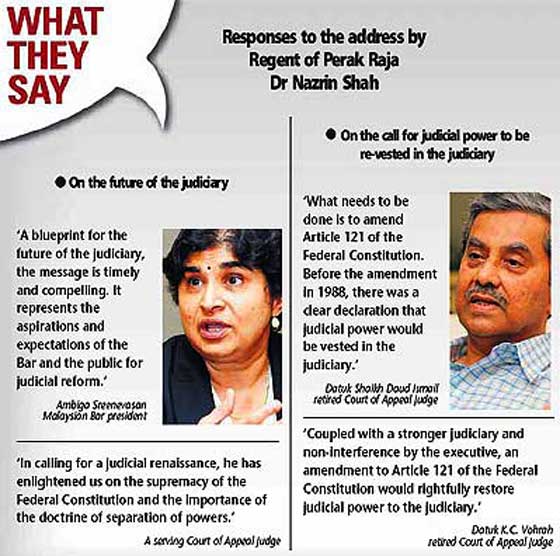©News Straits Times (Used by permission)
by V. Anbalagan

PUTRAJAYA: The three pillars of government -- the legislature, executive and judiciary -- must respect each other's jurisdiction in order for them to keep a positive image in the eyes of the public, the nation's top judge said.
"They must subscribe to and practise the doctrine of separation of powers, as provided in the Federal Constitution," Chief Justice Datuk Abdul Hamid Mohamad said.
He said the executive "should not and should not appear" to interfere with the decision of judges.
"The judges should be strong enough to resist any attempt to interfere with their independence, if such an occasion arises."
Abdul Hamid said a lot depended on the judges themselves, whether they were strong enough to maintain their independence.
"Once the public is convinced that there is no interference by the executive in the decision of judges, half the battle is won," he said at the opening of the annual judges' conference yesterday.
Abdul Hamid, who became the chief justice five months ago, said the judiciary was suffering from the negative perception of the public.
He said it was not the result of what had happened over the last few months but an accumulation of what took place over the past 20 years.
He said such a perception was caused by factors within and outside that affected the judiciary
Abdul Hamid said judges, too, played a role in redeeming the image of their institution.
"If the public is convinced that judges are independent, incorruptible, hardworking, fair and free from vested interests, then we are going in the right direction."
In this respect, the choice of persons appointed as judges was important, he said.
"Judgeship is not a reward, not a semi-retirement. It is honest, hard work."
Abdul Hamid, addressing the conference for the first and and last time as chief justice, will retire in October.
He said even if he was to be the top judge for only one day, he was determined to do what he believed to be right.
"This includes saying what I honestly believe to be right and needs to be said."
- On the proposal to set up a commission to appoint and promote judges, he said:
"If the executive believes that it will help in identifying the right candidates, if it will help to redeem the negative perception of the judiciary, if it will help regain the public confidence, why not?
"However, we must make sure the right people are appointed to the commission.
"They themselves must be people of integrity, knowledgeable, incorruptible, fair and without any vested interest. They should not have an agenda of their own.
"Neither should they be the conduit pipe for lobbying for the judgeship. Whatever system we have, in the final analysis, it is the people who implement the system that matter."
- On writing judgments:
"Judgments are something every judge should be proud of. They reflect our knowledge, intellectual honesty, analytical power, ability to grasp the issues, express ourselves clearly, command of the language, style of writing and, indeed, our whole character.
"When the judgment is written for us, there is a great temptation to merely place our signature to reduce the statistics of unwritten judgments. I think it is a dereliction of duty for a judge to ask someone, including his/her research officer to draft a judgment.
"A judge who writes a judgment for another judge and a judge who allows himself to be influenced by another person in arriving at his decision commits a misconduct."
- On changes to the law:
"When a provision of the written law has been in the statute book for decades and the courts, including the apex court, had repeatedly considered and consistently ruled on the matter, we should as far as possible not change the interpretation.
"If a change to the law is needed, let it be done by the legislature.
"We should know our function. Whether we like the law or not, whether we think it is harsh or not, if the law is a valid law, it is our function to apply it. No judge is a parliament."
- On Islamic banking, finance and takaful, which is a multi-billion-ringgit business:
"Countries all over the world are going all out to attract petro-dollars by offering Islamic financial products.
"Malaysia is among the big players in the industry.
"One of the matters that arises is the competency of the courts in determining Islamic law issues arising from such transactions.
"In Malaysia, the government had considered the limitations of the various institutions and decided to establish the Syariah Advisory Council at Bank Negara for such issues to be referred to for decision.
" So, I urge all of you to refer the issues to the committee for a ruling. This is provided by law."


No comments:
Post a Comment